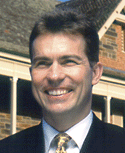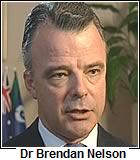|
News & Views item - November 2005 |
![]() Criticism of Dr Nelson's Quashing of ARC Grants Mounts -- Seen as Increasing
Political Interference in Decisions About Research Projects. (November 14,
2005)
Criticism of Dr Nelson's Quashing of ARC Grants Mounts -- Seen as Increasing
Political Interference in Decisions About Research Projects. (November 14,
2005)
 |
|
Prof. Peter Høj |
 |
The Australian Financial Review's Sophie Morris reports that the Academy of Humanities, Academy of Social Sciences, Academy of Science and Academy of Technological Sciences and Engineering "have sounded the alarm over what they fear is increasing political interference in decisions about which research projects deserve public funding."
Last year the Minister for Education, Science and Training, Brendan Nelson, quashed funding for two humanities projects and refused to reveal which proposals he blocked thereby negating a requirement for justification. This year he is understood to have blocked funding for some half-dozen proposals which had been recommended following peer review and approval by the board of the Australian Research Council (ARC).
Australian Academy of the Humanities executive director John Byron told Ms Morris that the ministerial veto over the recommendations of the ARC's College of Experts set a disturbing precedent, which could be exploited under a future minister. "It's a slippery slope," he said. "All manner of publicly valuable but politically controversial research could be de-funded."
Australian Academy of Social Sciences executive director, John Beaton said, "There's no convincing argument that says lay advice should overrule expert and peer advice."
Executive secretary of the Australian Academy of Science, Sue Serjeantson, observed that while some research might be "politically uncomfortable" it was important that all research be judged on its academic merit.
While Australian Academy of Technological Sciences and Engineering president John Zillman made no comment regarding Dr Nelson's overriding the recommendation of the ARC's College of Experts or the ARC Board he told Morris that the academy had protested to the minister over his decision to scrap the ARC board.
Meanwhile, while there is media comment that the CEO of the ARC, Peter Høj, is "less than thrilled" with some of the actions taken by Dr Nelson with regard to the functioning of the ARC, he has been increasingly circumspect in his public statements.